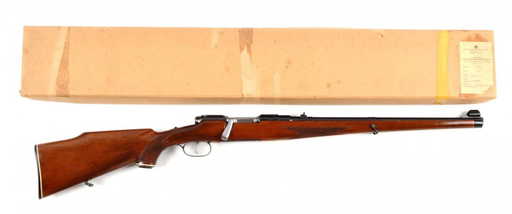
Mannlicher Schoenauer Rifle Serial Numbers
I knew the gun was post-1912 based on the proofs. The name on the scope (Emil Kerner & Sohn) provided another clue as the '& Sohne' nomenclature first shows up in the mid-1920s. The serial number on the gun is 9857 and the serial number on the scope is 6581. Mannlicher-Carcano; Mannlicher-Schoenauer. The chamber and buttstock. No serial numbers are stamped on the other parts of the rifle.
Mannlicher-Schoenauers and their proprietary cartridges have lived in a world of song and story for over 110 years, and they are still going strong in 2010 as can be discerned by the advent of the.376 Steyr in the 1990s and the addition of the impressive.450 Marlin to the product line in the early 2000s. Command and conquer red alert retaliation psp iso download torrent. Traditional interest remains high concerning the 6.5x54mm Mannlicher-Schoenauer of 1903, the 8x56mm Mannlicher-Schoenauer of 1908, and the 9.5x57mm Mannlicher-Schoenauer of 1910, even in this day of high velocity ammunition, new stubby magnums and high intensity cartridges. So, what is the mystique of the Mannlicher that keeps these 110 year old firearms in the sporting interest?

A writer can launch himself into page upon page of superlatives, legends, old hunting tales, personalities, and notorieties, such as Bell, Taylor, Stigand, and Sheldon, but, the mission of describing the mystique of the Mannlicher remains elusive, for there will always be one more incident, one more person, or one more characteristic to describe and discuss. After all, with 110 years to develop an intense following from a world often populated with intense and energetic people, the chance for a specific firearm to gain a famous and peculiar niche in history is only natural. This commentary is not intended to be a historical account of the Mannlicher-Schoenauer (M-S) and Steyr-Mannlicher (S-M) cartridges, but rather a listing of the cartridges chambered for these rifles and a for information purposes, nor does this writer profess to describe every variation of these Steyr rifles and carbines, as the factory continually produced uncatalogued limited production runs for special customers. Various models of commercial Mannlicher-Schoenauer rifles and carbines were officially manufactured at the Steyr factory in Austria from 1900 to 1968, with clean up production adding approximately two years (1969 and 1970) of additional production to the noted manufacture dates. It may be argued that the origination dates should be extended into the early 1890s, as far as cartridges go, for the 6.5x53mmR, rimmed, was indeed the first of the famous 6.5mm Mannlicher rounds to be sold commercially. However, these earlier rifles did not utilize the rotary magazine for which the Mannlicher-Schoenauer and Steyr-Mannlicher firearms are famous.
What then, are the “Mannlicher-Schoenauer” cartridges? The pure Mannlicher-Schoenauer proprietary cartridges as chambered in the firearms of the SteyrWerke are as follows, (1) 6.5x54mm M-S of 1903, (2) 9x56mm M-S of 1905, (3) 8x56mm M-S of 1908, (4) 9.5x56mm M-S of 1910 (more on the names of this cartridge in its own section.) Other cartridges that are reputed to be Mannlicher, such as the 9.3x57mm, 10.75x57mm and 10.75x68mm, are more likely Mauser developments and rarely if ever seen in the M-S or S-M. The 9.3x57mm and 10.75x57mm being mentioned largely because some sources believe they were once Steyr cartridges, although specimens of such rifles have yet to emerge. The total listing of known chamberings for M-S and S-M is given in, with an additional list of chamberings for the pre-M-S style firearms of 1890s vintage.
Please note that this listing may not be all inclusive, as new chamberings for all models continue to appear, some catalogued and some uncatalogued. Now to examine the Mannlicher-Schoenauers and their cartridges. The original 6.5mm examples are interesting because of the difference and compatibility of the same. The 6.5x53.5mm Rimmed and the 6.5x54mm are the only example of a rimmed and rimless cartridge being loaded to the same performance level, something that probably explains the use of the 6.5mm Rimmed by explorers such as Charles Sheldon well into the twentieth century, when the more modern rimless 6.5x54mm was already well established. Somehow, I don’t believe that modern power or design ever entered into Sheldon’s mind.
He wanted performance and CHEAP, and the 6.5x53.5mm rimmed gave both to him, there is no accounting for taste! On the other side of the coin, the 6.5x54mm was widely accepted by the hunting establishment when they discovered the potency of the long nosed 160 grain FMJ bullets when used upon dangerous game. Of course, a large part of this success was also related to the changes in firearms, marksmanship, and hunting styles as well. The changeover from big bore black powder arms, to the modern small bore power house rounds like the.375 H&H and the.416 Rigby was tantamount to a complete changing of the rules in Africa and India, with the highly effective Mannlicher successfully hanging on to the coat tails of the larger bore cartridges. The main feature of the Mannlicher was that the users of the Mannlicher had to be excellent marksmen to achieve the goals they wanted. The professionals, and indeed, these men were professional, did achieve their goals with the 6.5x54mm Mannlicher.